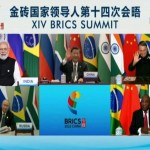The 14th summit of BRICS countries (Brazil, Russia, India, China and South Africa) was hosted by President Xi Jinping in virtual mode on 23 June. A high-level dialogue on global development involving BRICS leaders and those from 13 like-minded countries followed the next day. These meetings represent an important development in global politics amidst the ongoing Ukraine war and evolving dynamics in the Indo-Pacific. The meaning of Beijing-hosted deliberations must be deciphered using a realistic lens, and one that looks through the verbosity to the core of the 7500-word-long Beijing Declaration. The rhetoric and reality of the grouping’s solidarity and divisiveness should be dissected objectively.
BRICS was created in 2006, the product of an era of unipolarity presided over by the lone superpower, the U.S. A successful attempt by this grouping to project a non-western perspective on world affairs was valuable to the developing world. Slowly the organization grew, forging intra-BRICS cooperation under the three pillars of politics and security, economic and financial, and cultural and people-to-people exchanges. It played a leading role in articulating the case for multipolarity as well as reformed multilateralism.
But all this was before Galwan, Covid, and Ukraine happened. Of these seminal developments, the first seriously dented China-India ties and trust; the second revealed the grouping’s failure to work together to assist the needy; and the third turned Russia, a senior member, into damaged goods. The weakening of BRICS and the loss of its credibility became inevitable.
No one is more aware of this unspoken reality than the current chair, China. It explains why Beijing employed new devices, partly to distract attention from the grouping’s vulnerabilities and partly to inject fresh energy into it. The Beijing summit was anchored in a grandiose theme: ‘Foster High-quality BRICS Partnership, Usher in a New Era for Global Development.’ The first objective was sought through a special focus on improving global governance. The summit leaders used eight adjectives – ‘more responsive, effective, transparent, democratic, objective, action-oriented, solution-oriented and credible’ – to depict the kind of multilateral organizations needed by the world. It assumes a system that respects the sovereignty and territorial integrity of all countries. Surely Ukraine and India won’t agree that the BRICS community is heading in that direction.
The other objective for a new era of development was sought by expediting the expansion of membership. The ostensible purpose is to democratize and diversify BRICS to enhance its weight and influence in international affairs. However, China’s attempt to play up the role of ‘Emerging Markets and Developing Countries’ (EMDCs) is a thinly disguised measure to capture the leadership of the Global South. The other members, particularly IBSA partners of India, Brazil and South Africa, are uncomfortable with it.
Thus, the diplomatic tussle goes on between Beijing, backed by Moscow, which prefers an immediate expansion to include several nations of their choice and the other three members which advocate a go-slow approach. The Beijing summit endorsed a consensus view that there is first “the need to clarify the guiding principles, standards, criteria and procedures” for the expansion process. It is time to tell China clearly that every member holds a veto on new candidates. Perhaps the eventual outcome will be to admit five new members representing diverse regions, to which none of the existing members have objections.
The current tugs aside, BRICS has secured several notable gains in the past 16 years. The $100 billion-strong New Development Bank (NDB) has an impressive portfolio of 78 projects worth $29.3 billion and has recently admitted four new members of its own – the UAE, Bangladesh, Egypt and Uruguay. Other achievements include a $100 billion Contingent Reserve Arrangement (CRA), and an array of measures to strengthen internal cooperation in sectors ranging from agriculture and rural development to S&T and innovation, and vocational education and capacity-building.
However, if the major members of BRICS are serious about truly strengthening the grouping, they should first do something practical. For example, Russia should consider commencing negotiations for a peace agreement with Ukraine, and China should work for an accord on disengagement and de-escalation in eastern Ladakh. The presence of over 100,000 armed troops in the India-China border region does not align with the flowery rhetoric about building BRICS solidarity.
From India’s perspective, BRICS is not only desirable but also essential. It helps New Delhi to assert its independence and strategic autonomy in foreign policy making. The BRICS summit will be followed immediately by the summit of the G7 where Prime Minister Narendra Modi will participate in its outreach deliberations. His 270-word address at the BRICS summit was a signal by itself.
The BRICS leaders held forth on weighty themes such as reforming global governance, safeguarding peace and security, and promoting economic recovery. Whether they also attempted to internalize that the gap between their declarations and delivery is hurting the institution, is unclear. For example, it is time China and Russia moved beyond their long-frozen position and declared full support for their IBSA partners to enter the UN Security Council as permanent members. BRICS needs to grasp the basic reality that its internal solidarity and mutual trust should first be enhanced before it can hope to improve the world.
And rhetoric alone will not do.
This article was first published in The Hindustan Times.
Rajiv Bhatia is Distinguished Fellow, Foreign Policy Studies Programme, Gateway House, and a former Ambassador.


